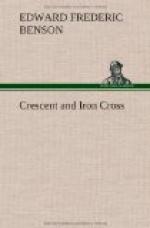discuss, and there again—for the Emperor’s
sister was Crown Princess of Greece—conversation
must have been a shade difficult. Altogether,
in spite of the Emperor’s lifelong desire to
visit the Holy Places in Palestine, it was an odd
moment for a Christian monarch to visit the butcher
of Constantinople. But the truth is that Wilhelm
II. had a very strong reason for going to see his
brother, for the fruit of German policy in Turkey
was already ripening and swelling on the tree, and
the minor disadvantages of visiting this murderous
tyrant while still his hands were red with blood was
more than compensated for by the advantages of having
a heart-to-heart talk with him on other subjects.
Germany had already begun her peaceful penetration,
and the real motive of the Emperor’s visit was,
after swords and orders had been exchanged, to make
the definite request that bodies of colonising Germans
should be allowed to settle on the Sultan’s
dominions in Asia Minor, and a hint no doubt was conveyed
that there would be plenty of room for them now that
there were so many Armenian farms unfortunately without
a master. But, like Uriah Heep, the Emperor had
attempted to pluck the fruit before it was ripe, or,
to use a more exact simile, before he was tall enough
to reach it. In vain he represented to Abdul
Hamid the immense advantages which would result to
Turkey by the establishment of those Gott-like German
settlers in Asia Minor. Out of his colossal egalo-megalomania,
of which we know more now, he thought that any request
which the All-Highest should deign to make must instantly
be granted. But he met with a perfectly flat
refusal, and the baffled All-Highest left Constantinople
in an exceedingly bad temper, which quite undid all
the good that the balm in Gilead and the sacred associations
of Jerusalem had done him. It is pleasant to
think of the Pan-Islamic merriment with which Abdul
Hamid must have viewed the indignant exit of his Christian
brother, who had come such a long way to see him, and
was so tactful about the Armenian atrocities.
He might perhaps—for those Christians were
very odd pigs—have expressed horror or remonstrance.
Not at all: he was much too anxious to get his
request granted, to make himself disagreeable.
But did his Christian brother really think that all
those massacres over which Abdul Hamid had spent so
much time and money, had been arranged in order to
settle those nasty progressive Germans in the lands
that had been so carefully depopulated? Why, the
whole point of them had been that the Armenians were
too progressive and prosperous, thus constituting
a menace to the central Government, and certainly
Abdul Hamid was not meaning to put in their place settlers
even more progressive and with a stronger backing
behind them. So off went the All-Highest back
home again, very much vexed with Abdul Hamid, and
possibly (if that was not sacrilegious) with himself
for having been in too great a hurry. There was
more spade-work to be done yet before Turkey was ripe
for open and avowed colonisation by the Fatherland.




